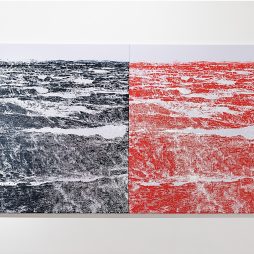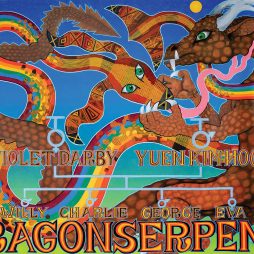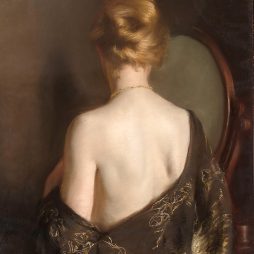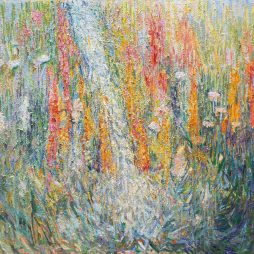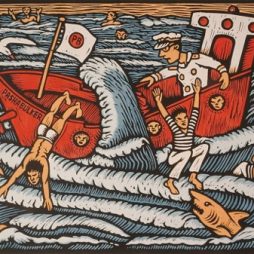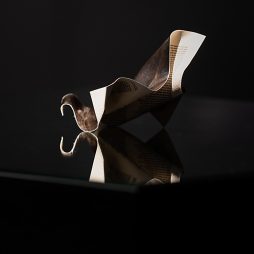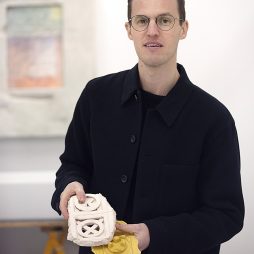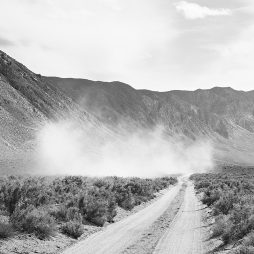Simone Arnol and Bernard Singleton washing away the toxins
Simone Arnol and Bernard Singleton are cultural leaders, making art that invokes culture and Country to heal the people and the land. Their powerful works combine photography, mark-making, and cultural tool making skills in incredibly powerful ways. We need healing, and Simone and Bernard’s 2024 Flying Arts Alliance, Art for Life Award winning work is where we find it.
The colonial spasm that started in the seventeenth century, that saw the world carved up to fuel capitalism and created a socio-political landscape that led to oligarchs taking over the US, is killing the world. When you kill the land the people die, our health relies on a healthy planet yet ours gets more and more sick.
Healing is important for all people, because life without health may actually be worse than death. It could sensibly be argued that for Indigenous people that drive is stronger, that need is stronger, because our health has suffered so greatly from the impacts of colonisation, from the change of diet that colonisation has brought, and from the impacts of intergenerational trauma. Things have been apocalyptic for Aboriginal people and for our sacred land and when we heal Country, we heal the people, and when we heal the people we heal the land.
Gunggandji artist Simone Arnol and her partner and collaborator Umpila and Djabuguy / Yirrgay artist Bernard Singleton do more than just make art; like many Indigenous artists they are also important cultural practitioners, holders of cultural knowledge, and leaders among their people. Simone is an award winning artist and photographer, and is the manager at Yarrabah Arts and Cultural Precinct in Yarrabah, just south of Cairns, helping other artists make art and maintain culture. This is important work because art for Aboriginal people is more than just art, it’s an expression of culture, to make art is to care for culture and for the people in your community. In other words, art for Aboriginal people is a tool for healing and in that way is far more than just art. Simone, being a cancer survivor and absolute powerhouse knows this more than most people.
Bernard’s art practice is grounded in his culture and the culture of his people, reviving classical carving and weapon / tool making techniques that are close to being forgotten all over the continent. Without the revival of these weapons and tools, carved and woven from materials found on Country, these timeless skills, that are so much a part of culture will be lost forever. This is a recurring theme in Aboriginal art over the last decade or so, for example, the Kulata Tjuta (many spears) collaborative project in the APY lands in which Elders teach youth skills at risk of being lost, specifically spear making.
In the series Emanate, 2023, Simone and Bernard have collaborated, combining their arts practices and their overlapping cultural knowledge to stage a series of photographs of members of their extended families holding cultural tools and weapons. Each model was painted up with clay and natural pigments in a pattern reflecting the cultural object they held, bringing the people into the artifacts and the artifacts into the people. This demonstrates in a visceral way the knowledge that we and our culture and Country (including our non-human relatives on Country) are inseparable. Unlike mainstream Australian culture we do not see ourselves as separate from nature or from Country but rather as a part of the natural world. That is the story told in the art.
That knowledge brings healing, returning to and maintaining culture brings healing, healing the land brings healing, working with community brings healing.
Yimbi (Basket – to leach out toxins, destress or filter out noise), 2023, part of the Emanate series, features a soaking or leaching basket, an item that was common to most Aboriginal cultures before colonisation. These baskets were used to soak poisonous nuts or tubers to leech out the toxins, depending on the food item being treated that way, they were either soaked raw or cooked, and the treated food items were important for the survival of the people. The model holding the basket is painted up in a hash pattern like the weave of the basket bringing the cleansing to the people.
The world is toxic and getting more so, filled with noise and hate. We need to de-stress, and we need to filter out noise to do so; filtering out is part of decolonisation, part of healing, of returning to culture. Yimbi tells us to filter out the poisons, the bad words and the hate, and hold onto that which is nourishing when so much in our contemporary world is toxic.
Perhaps the best thing to do is to place the entire world in a basket, in clean running water to wash it clean. Alternatively, we can heal our people, wash away the toxins harming us. That to me is the message of Yimbi—to heal ourselves, heal our people, and let the people heal the land. When we do that, we decolonise the continent and everyone in it, we respect the land and allow it to heal, and in a healthy world perhaps our own healing is possible.




